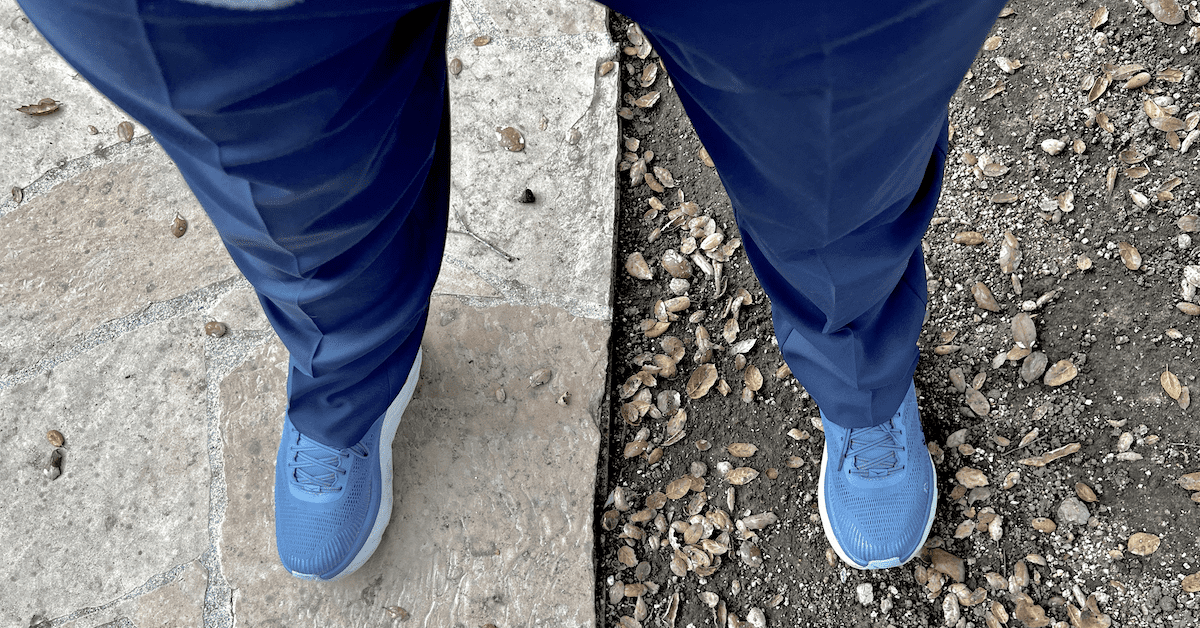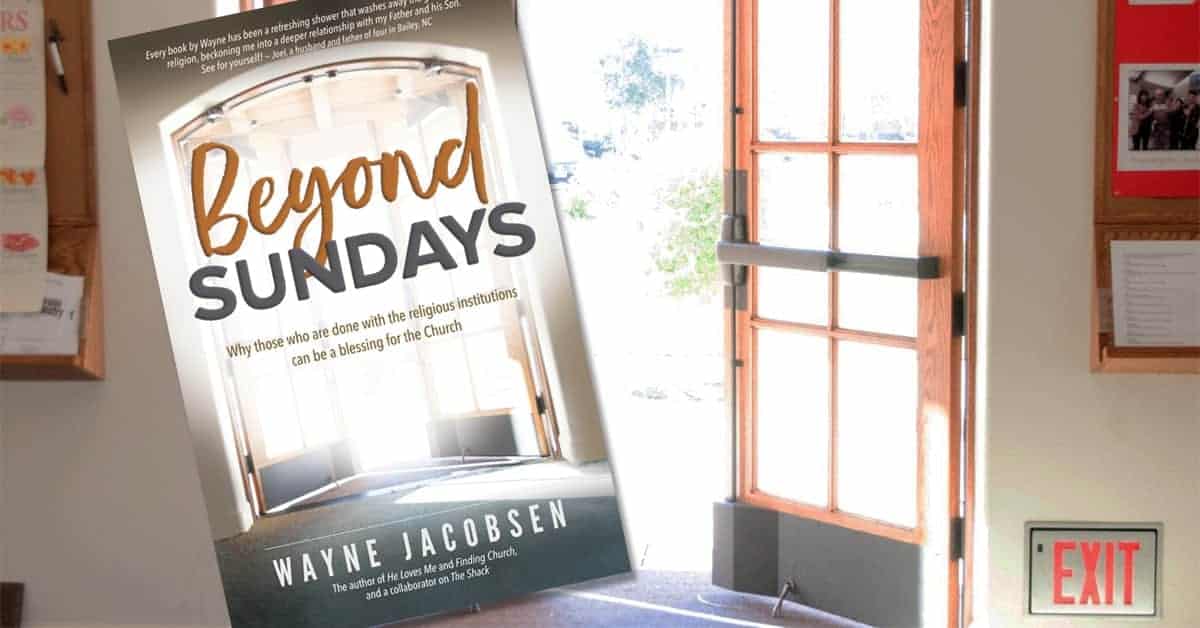Sean Kennedy, an author, and friend from the UK, wrote me about my most recent podcast with Mary, a new believer finding her legs on a relational journey against the religious voices that want to draw her into the captivity of guilt and obligation. He wrote about living on the edges in a way I hadn’t heard before, and it made a lot of sense to me. With his permission, let me share it with you:
A couple of things Mary said reminded me that the only place we can truly walk in freedom is on the edge. Jesus was hugely relational and yet at the same time an edge person. He was always working relationally, but he did so outside the institutions or at least on the edge of them. He taught in the synagogue occasionally and ate with the teachers of the law. But mostly he taught outside the synagogue in the homes and villages and fields where the ordinary people lived and worked. He was critical of power, yet when invited he met and ate and talked with the powerful. He also hung out on the edge with the sick, the foreigner, the sinner and those society disapproved of. His position on the edge helped him see things as they really were. Wayne and Kyle you have become edge guys. You’ve done your time on the inside of the institution, to see that it is usually an unhealthy dysfunctional place to be. What I think is incredible is that Mary is managing so early to stay on the edge and not get sucked in.
When we are sucked into the center of an institution there we are in many ways at our most blind. Only when we live and work on the edge can we see more clearly. By all means go to a congregation if Jesus leads you, but stay on the edge with one foot inside it and one on the outside. On the inside we risk getting infected by groupthink and all sorts of religious oughts, shoulds and musts and becoming slaves of the institution. Only on the edge can we have a wider perspective.
We can see more clearly what is going on both the inside (good and bad) and on the outside. Only on the edge can we also see God’s invitations coming from surprising and interesting new directions. Amazingly I think Mary is somehow realizing this and resisting the temptations of being an insider. It is so tempting when we are invited in to become a member of the institution – and especially when we have a particular talent the institution recognizes in us. It’s not necessarily wrong, and may be an important part of our journey so long as we realize it is only for a season. It can become dangerous when we settle down and make the institution our home. And when we do spend a season on the inside it is especially important we make friends both with those on the edge of it and those on the outside of it so they can help us see what is wrong about the inside. Only then can we become a positive force for change whether it be on the inside or outside.)
I love his thoughts here. The people I see thriving in their relationship with God in these tumultuous times are those who aren’t committed to a specific kind of groupthink but are learning to follow the voice of the Shepherd. No one or no group has it all right. That’s as true of spiritual truth as it is cultural engagement. If you can’t see the strengths and weaknesses of whatever group you consider yourself a part of, you probably don’t spend enough time with people who think differently. That’s also true if you never see validity in the concerns of those outside your group. None of us knows all we need to know; thus, seeing others who disagree with us as evil will only lead us astray. That’s how the world seeks to manipulate us, even that worldly spirit among followers of Christ.
The truth is we’re all a bit flawed, and Jesus is still taking shape in us. Humility will go a long way to help us discern truth from lies. If you are not seeing Jesus point out the illusions in your journey from time to time, it might be because you’re not listening. You seek comfort in people telling you what you want to hear, not what you need to know. Only by hearing the voice of our Shepherd can we know what’s real and what isn’t.
The people living most redemptively in the world live on the edges, as Sean described. Isn’t that why Jesus challenged his disciples to be in the world and not of it? One thing that will help you do that is to live on the edges of groups with whom you identify. Don’t get in the center where it’s easy to be blinded; keep others outside of it in your eye line. When you have compassion for them, too, you are in a better position to discern what is true. God’s way may not be the one that I think serves me best. We are citizens of a kingdom that transcends politics, ethnicity, theology, and personal preference.
This reminds me of a story about Joshua on his way to Jericho in Joshua 5. He came upon a mighty man with a drawn sword standing in his path. Startled, Joshua challenges him most likely with all the hubris of a man on a mission for God, “Are you for us or our enemies?”
“Neither,” the man replied, “but as commander of the army of the Lord I have now come.”
It’s a silly question to ask God or his hosts if they are on our side in whatever battle we’ve engaged. It’s far more important for us to be on his. Even if we think our struggle is as clear-cut as the battle Joshua was about to engage in, we dare not think our side is always right, or we’ll end up mired in human thinking.
Jesus told his followers to be as wise as serpents and as harmless as doves. That warning has never been more timely. There’s no way we can do that without an attentive ear to our Shepherd and a more expansive view of the world than what any media can feed us.







Thank you, Wayne.. very useful and timely stuff, and wise.
Hi Wayne..loved your blog this morning about living on the edge..SO good! I wrote this song shortly after severing ties with the organization that my wife and I had served in for thirty years that morphed into a stifling legalistic box. So thankful to be free again and living “edgy” with our loving Father! Thought you might enjoy the song.
https://www.reverbnation.com/timstilescolorado/song/20256708-on-the-edge?pwc%5Bbranded%5D=1
Thanks, Tim, for sharing your gift here.
Loved your song Tim!
Thank you Ruth!!
Great tune Tim and very appropriate lyrics! We as well have rejected the legalistic box and found the fresh winds of our Lord’s presence in our lives. Thank you for sharing it!
Thanks for listening, and welcome to the edgy freedom!!
this is so uplifting Wayne. thank you for your encouragement as always. Over 25 years ago, I moved away from an elitist extremely legalistic sect having been ex-communicated because I remarried. For another decade I worshipped in other denominations and engaged in Mission work with my husband, but always felt something was missing. One day I happened on one of your books “So you don’t want to go to church any more” and I was hooked. This was what I had been searching for. Happily for the last decade I have ‘lived on the edge’ never joining a denominational group, but engaging with a small group[ if ladies in my country town who are Christians and who all attend various church groups. Yet we have great fellowship together and they accept me as their sister too. Best of both worlds Eh?
Yes, that sounds awesome. The fellowship and community without all the obligation and guilt. Love that they are so generous. It probably helps that they don’t all attend the same congregation. That tends to lead to more generosity with differences.